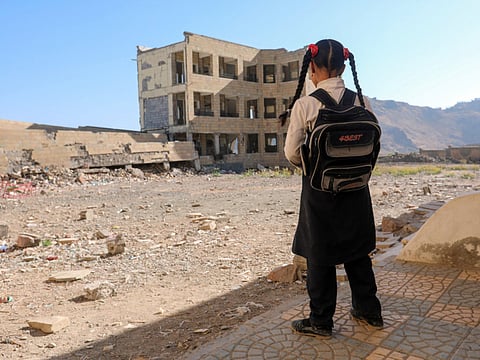Al Houthis abduct 7 international aid workers in Yemen
International Medical Corps said five staff members and two drivers had been detained

Sana’a: Iran-backed Al Houthi rebels have abducted seven local employees of a humanitarian aid group and accused them of spying for foreign intelligence, according to security officials.
The rebels raided a hotel the humanitarian group was using in Ibb province, taking the employees to a prison in the capital, Sana’a.
International Medical Corps said five staff members and two drivers had been detained, and that they were working to secure their release so they could continue to aid a population suffering from war.
“Despite the ongoing conflict that has caused a steady deterioration of humanitarian conditions across the country since 2015, our relief efforts continue to provide a lifeline for families,” in several Yemeni cities, said Rebecca Gustafson, a group spokeswoman.
Al Houthi rebels have intercepted 63 ships and 223 convoys carrying humanitarian aid to areas under their control since ejecting President Abd Rabbo Mansour Hadi from Sana’a in early 2015.
Rebels seize relief ships immediately after docking at Hodeidah and Saleef seaports and divert supplies to their fighters battling government forces across Yemen.
Hundreds of trucks transporting vital medicines, tents and food heading to rebel-held territories have also been seized by Al Houthis and goods sold in the black market.
Al Houthis have also abducted 30 aid workers from areas under their control, including several Norwegian Refugee Council staff, in the Red Sea city of Hodeidah.
The harassment of aid workers and interception of humanitarian convoys by Al Houthis is causing famine in areas under their control.
The impact of Al Houthis’ seizure of aid convoys can be seen in Taiz, Yemen’s third largest city, where local aid organisations and health officials say the population of the city is facing starvation.
Tens of thousands of people, including women and children, are paying a heavy price for Al Houthis’ two-year-long siege of the city.
Vital food staples are scarce and expensive as local merchants use the dangerous mountain routes to bringing in their goods to the city.
Taiz has become the scene of bloodiest clashes between government forces and Iran-backed Al Houthis that killed hundreds of people and injured thousands others, according to local and international right groups.
After failing to take control of the city’s downtown, Al Houthis imposed a siege on Taiz, banning people from leaving or entering areas under their control.
Last year, government forces partially broke Al Houthi siege after taking control of the western entrance of the city and secured a road that connects Taiz city to the port.
But wary local aid workers said international organisations refuse to use the liberated road out of fear of being attacked by Al Houthis and continue to send aid convoys from Sana’a through Al Houthi-manned checkpoints.
Sign up for the Daily Briefing
Get the latest news and updates straight to your inbox



